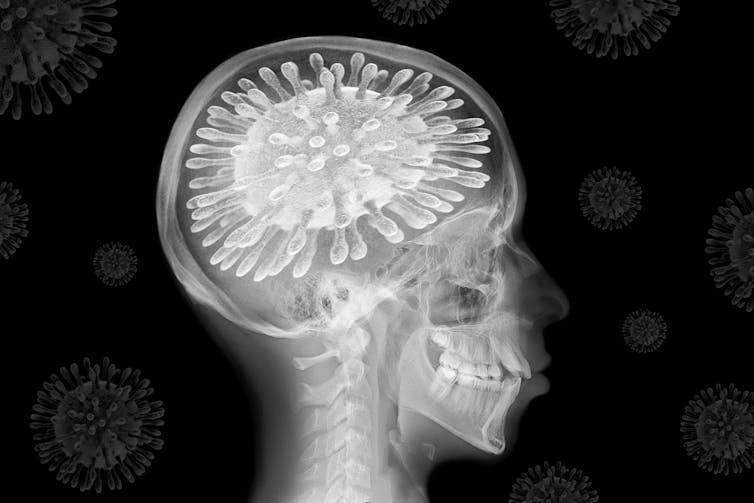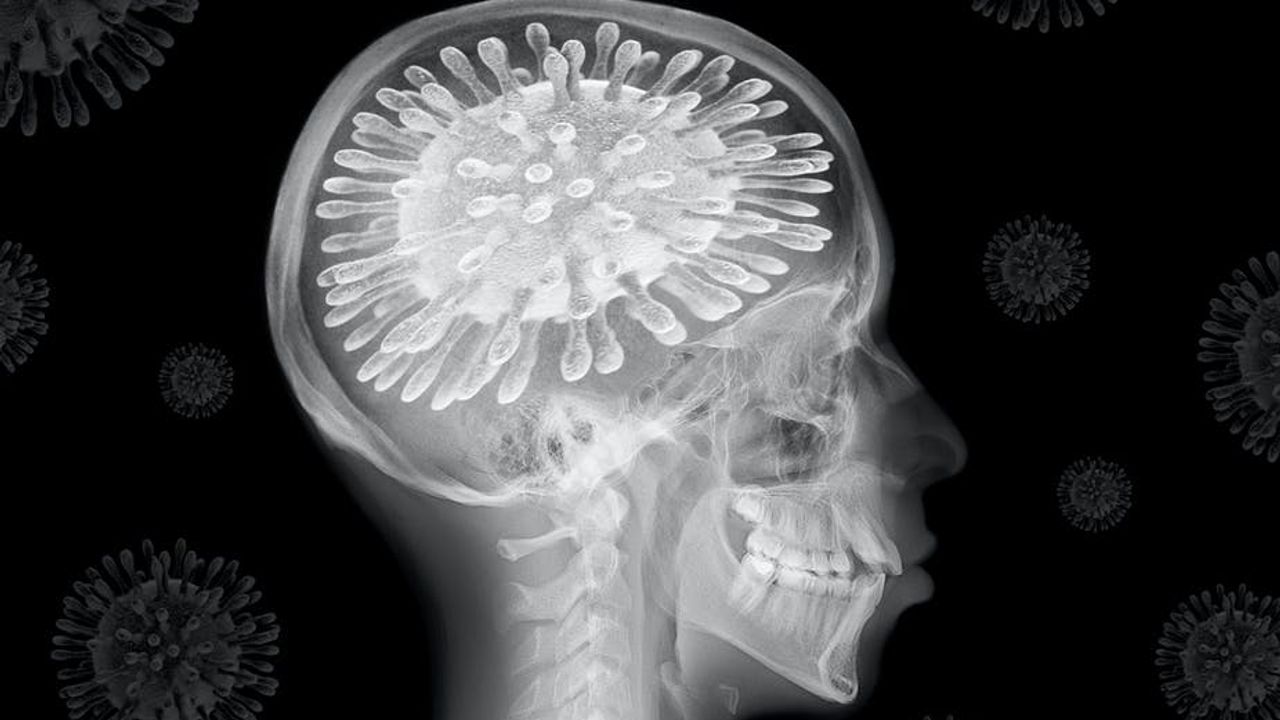COVID-19'a yakalanmış olsanız da olmasanız da, beyniniz son birkaç ayda muhtemelen değişmiş olacaktır. Virüsün kendisi, anksiyete ve depresyon ile birlikte bir dizi nörolojik soruna neden olabilir . Pandeminin neden olduğu izolasyon ve endişe , benzer şekilde beyin kimyamızı değiştirebilir ve duygudurum bozukluklarına neden olabilir.
Nöropsikofarmakoloji İncelemelerinde yayınlanan yeni , pandemiye bağlı beyin değişikliklerinin en iyi nasıl üstesinden gelineceğini araştırdık.
COVID-19 enfeksiyonu ile başlayalım. Duygudurum bozukluklarına ek olarak, yaygın semptomlar arasında yorgunluk, baş ağrısı, hafıza kaybı ve dikkat sorunları yer alır. Bu beyin değişikliklerinin, iltihaplanma ve serebrovasküler olaylar (beyne giden kan akışının bozulmasının neden olduğu bir sendrom) dahil olmak üzere bir dizi nedeni olabilir .
Araştırmalar, virüsün , kokunun işlenmesi için önemli olan ön beynin koku alma ampulü aracılığıyla beyne erişebileceğini gösteriyor . Koku kaybı, COVID-19'lu birçok hastada bir semptomdur.
Koku duyunuzdan sorumlu sistemin bir parçası olarak, koku soğanı, duygu, öğrenme ve hafızada önemli bir rol oynayan amigdala, orbitofrontal korteks ve hipokampus dahil olmak üzere diğer beyin bölgelerinde işlenmek üzere koku hakkında bilgi gönderir.
Koku soğanı, diğer beyin bölgeleriyle kapsamlı bağlantılara sahip olmanın yanı sıra , zevk, motivasyon ve eylem için önemli olan kimyasal dopamin açısından zengindir . COVID-19 beyindeki dopamin ve serotonin ve asetilkolin gibi diğer kimyasalların seviyelerini değiştiriyor olabilir, ancak henüz kesin olarak söyleyemeyiz. Tüm bu kimyasalların dikkat, öğrenme, hafıza ve ruh hali ile ilgili olduğu bilinmektedir.
Beyindeki bu değişiklikler muhtemelen COVID-19 hastalarının yaşadığı ruh hali, yorgunluk ve bilişsel değişikliklerden sorumludur. Bu da virüsü kapmış hastalarda bildirilen stres, anksiyete ve depresyon semptomlarının temelini oluşturabilir.

Ancak pandemi sırasında artan anksiyete ve depresyondan muzdarip olanlar sadece COVID-19 virüsüne yakalanan insanlar değil. Virüsün diğer aile üyelerine bulaşması veya yayılması konusundaki aşırı endişe, izolasyon ve yalnızlık da beyin kimyamızı değiştirebilir.
Tekrarlanan stres, vücuttaki kalıcı iltihaplanma için önemli bir tetikleyicidir ve beyni de etkileyebilir ve hipokampusu küçültebilir ve bu nedenle duygularımızı etkileyebilir. Stres ayrıca ruh halimizi etkileyebilecek beyin serotonin ve kortizol seviyelerini de etkileyebilir. Sonunda, bu değişiklikler depresyon ve anksiyete semptomlarına neden olabilir.
Beyin eğitimi
Bununla birlikte beyinle ilgili iyi olan şey, inanılmaz derecede plastik olmasıdır, bu da onun değiştirilebilir olduğu ve hasarı telafi edebileceği anlamına gelir. Hafıza kaybı ve depresyon gibi ciddi durumlar bile beyin fonksiyonunu ve kimyasını değiştiren şeyler yapılarak iyileştirilebilir.
Bizim kağıt COVID-19 hasta ve diğerleri - stres, anksiyete ve depresyon mücadele belirtilerine çözümler vaat de görünüyor.
Egzersiz ve farkındalık eğitiminin - şimdiki zamanda kalmamıza yardımcı olan tekniklerin - beyin stresi ile mücadeleye gelince yararlı olduğunu zaten biliyoruz . Gerçekten de çalışmalar, dikkat eğitimini takiben beynin prefrontal korteksinde (planlama ve karar verme sürecine dahil), hipokampus ve amigdalada yararlı fonksiyonel ve yapısal değişiklikler olduğunu göstermiştir .
Bir çalışma, sekiz haftalık eğitimden sonra (kontrollere kıyasla) sol hipokampusta, beynin hücre gövdelerinin çoğunu içeren doku ve merkezi sinir sisteminin önemli bir bileşeni olan gri madde yoğunluğunun arttığını gösterdi .
Önemlisi, bunlar COVID-19 virüsünden etkilenen tüm bölgelerdir. Ek olarak, oyunlaştırılmış bilişsel eğitim ayrıca dikkati , hafıza işlevini ve motivasyonu artırmaya yardımcı olabilir . Kalıcı veya şiddetli ruh sağlığı semptomları olanlar, bir psikolog veya psikiyatrist tarafından klinik değerlendirmeye ihtiyaç duyabilir. Bu gibi durumlarda, antidepresanlar veya bilişsel davranışçı terapi gibi farmakolojik ve psikolojik tedaviler mevcuttur.
Pek çok ülkenin henüz kilitli durumdan tamamen çıkmadığı ve sağlık hizmetlerine erişimde uzun gecikmeler olduğu göz önüne alındığında, giyilebilir cihazlar (aktivite izleyiciler) ve günlük hayata kolayca entegre edilebilen dijital platformlar (mobil uygulamalar) gibi modern teknikler, umut vericidir.
Örneğin, aktivite izleyiciler kalp atış hızı ve uyku düzeni gibi şeyleri izleyerek kullanıcının meditasyon, egzersiz veya ekstra uyku gibi aktivitelerden ne zaman yararlanabileceğini belirtebilir. Stres seviyenizi kendiniz azaltmanıza yardımcı olabilecek uygulamalar da var .
Bu teknikler muhtemelen herkes için yararlıdır ve bilişsel dayanıklılığı ve zihinsel sağlığı daha iyi teşvik etmemize yardımcı olabilir - bizi küresel pandemi gibi gelecekteki kritik olaylara hazırlar. Toplum olarak, beyin sağlığımıza, bilişimize ve refahımıza gelecek zorlukları önceden tahmin etmemiz gerekiyor. Bu teknikleri okullarda erken yaşlardan başlayarak yaşam boyu dayanıklılığı teşvik etmek için kullanmalıyız.
Coronavirus: the pandemic is changing our brains – here are the remedies

Barbara Jacquelyn Sahakian, University of Cambridge; Christelle Langley, University of Cambridge, and Deniz Vatansever, Fudan University
Whether you have contracted COVID-19 or not, your brain is likely to have changed over the past few months. The virus itself can cause a number of neurological problems, along with anxiety and depression. The isolation and worry caused by the pandemic can similarly alter our brain chemistry and cause mood disorders.
In our new paper, published in Neuropsychopharmacology Reviews, we have investigated how to best overcome the brain changes linked to the pandemic.
Let’s start with COVID-19 infection. In addition to mood disorders, common symptoms include fatigue, headaches, memory loss and problems with attention. There may be a number of reasons for these brain changes, including inflammation and cerebrovascular events (a syndrome caused by disruption of blood supply to the brain).
Research suggests that the virus may gain access to the brain via the forebrain’s olfactory bulb, which is important for the processing of smell. Loss of smell is a symptom in many patients with COVID-19.
As part of the system responsible for your sense of smell, the olfactory bulb sends information about smell to be further processed in other brain regions – including the amygdala, orbitofrontal cortex and the hippocampus – which play a major role in emotion, learning and memory.
As well as having extensive connections to other brain regions, the olfactory bulb is rich in the chemical dopamine, which is important for pleasure, motivation and action. It may be that COVID-19 alters the levels of dopamine and other chemicals, such as serotonin and acetylcholine, in the brain, but we can’t say for sure yet. All these chemicals are known to be involved in attention, learning, memory and mood.
These changes in the brain are likely responsible for the mood, fatigue and cognitive changes that are commonly experienced by COVID-19 patients. This in turn may underlie the reported symptoms of stress, anxiety and depression in patients who have contracted the virus.

But it’s not just people who have contracted the COVID-19 virus that have suffered from increased anxiety and depression during the pandemic. Excessive worry over contracting or spreading the virus to other family members, as well as isolation and loneliness, can also change our brain chemistry.
Repeated stress is a major trigger for persistent inflammation in the body, which can also affect the brain and shrink the hippocampus and therefore affect our emotions. Stress can also affect levels of brain serotonin and cortisol, which can affect our mood. Eventually, these changes can cause symptoms of depression and anxiety.
Brain training
The good thing about the brain, however, is that it is incredibly plastic, which means it is changeable and can compensate for damage. Even serious conditions such as memory loss and depression can be improved by doing things that alter the brain function and its chemistry.
Our paper looks at promising solutions to combat symptoms of stress, anxiety and depression – in COVID-19 patients and others.
We already know that exercise and mindfulness training – techniques that help us stay in the present – are helpful when it comes to combating brain stress. Indeed, studies have shown beneficial functional and structural changes in the brain’s prefrontal cortex (involved in planning and decision making), hippocampus and amygdala following mindfulness training.
One study showed an enhanced density of grey matter – the tissue containing most of the brain’s cell bodies and a key component of the central nervous system – in the left hippocampus after eight weeks of training (in comparison to controls).
Importantly, these are all regions that are impacted by the COVID-19 virus. Additionally, gamified cognitive training can also help improve attention, memory function and increase motivation. Those who have persistent or severe mental health symptoms may require clinical evaluation by a psychologist or psychiatrist. In such cases, there are pharmacological and psychological treatments available, such as antidepressants or cognitive behavioural therapy.
Given that many countries haven’t completely come out of lockdown yet, and there are long delays in accessing healthcare, modern techniques such as wearable devices (activity trackers) and digital platforms (mobile apps), that can be easily integrated into daily life, are promising.
For example, activity trackers can monitor things like heart rate and sleeping patterns, indicating when the wearer may benefit from activities such as meditation, exercise or extra sleep. There are also apps that can help you reduce your stress levels yourself.
These techniques are likely be beneficial to everyone, and may help us to better promote cognitive resilience and mental health – preparing us for future critical events such as global pandemics. As a society, we need to anticipate future challenges to our brain health, cognition and wellbeing. We should be utilising these techniques in schools to promote lifelong resilience starting at an early age.
Barbara Jacquelyn Sahakian, Professor of Clinical Neuropsychology, University of Cambridge; Christelle Langley, Postdoctoral Research Associate, Cognitive Neuroscience, University of Cambridge, and Deniz Vatansever, Junior Principal Investigator, Fudan University
This article is republished from The Conversation under a Creative Commons license. Read the original article.








